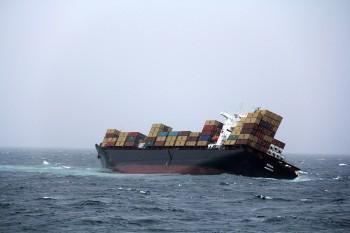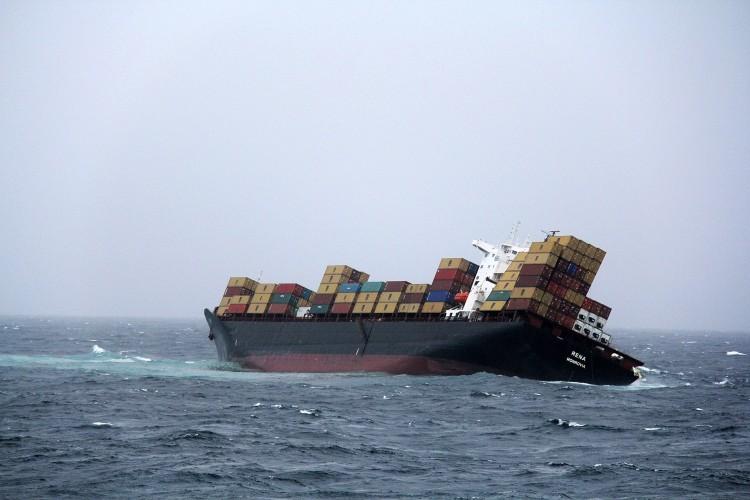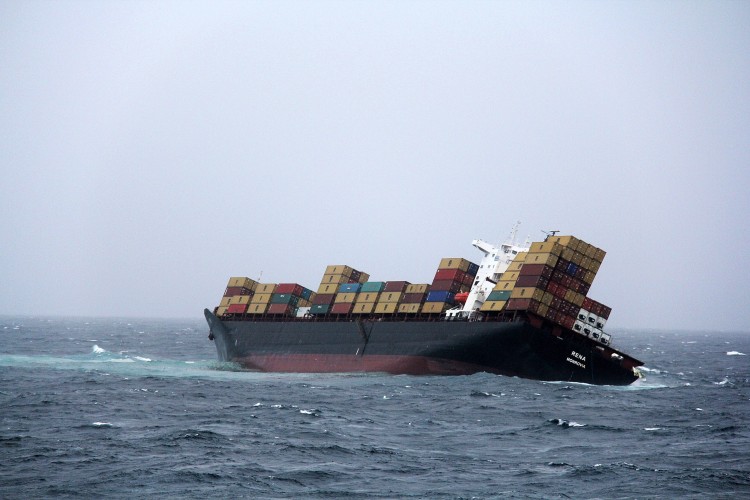The captain of the container ship Rena has been arrested and charged with “operating a vessel in a manner causing unnecessary danger or risk” under section 65 of the Maritime Transport Act, says Maritime New Zealand (MNZ).
The cargo ship, which MNZ says was carrying 1438 containers, ran aground on the Astrolabe Reef in Tauranga Harbour in good weather last Wednesday, 5 October.
Rena’s captain could face a penalty of up to $10,000 or 12 months in prison, but MNZ said in a media release that they could lay further charges.
According to the New Zealand Herald the captain, who was given name suppression during a court appearance, was celebrating his 44th birthday on the day the ship ran onto the reef.
Last night, Rena’s position had worsened and she is now listing at 17 degrees.
Up to 70 containers have come loose and are now floating in the sea. According to MNZ, these do not include the 11 containers that carry toxic materials.
People have been warned not to tamper with any containers that may come ashore as this would constitute an illegal act. Some containers could contain hazardous materials.
Beaches are being cleaned by trained teams who will be joined by defence force soldiers. Oil has reached the coastal area between Maketu and Mount Maunganui.
Alan Fleming, Forest & Bird’s Tauranga-based Central North Island Field Officer, says that around 200 birds had perished and another 24 oiled birds, including little blue penguins, shags and diving petrels, had been treated.
Forest & Bird, who are assisting efforts to resuscitate wildlife, are worried about the effect of the oil at this time of the year when many birds are nesting on offshore islands and headlands while feeding from toxic ocean waters.
“If the oil is on shore, its going to affect our shore birds such as New Zealand dotterels and oyster catchers. If it moves into the harbours and estuaries then its going to impact on migratory birds that are returning to our harbours from the northern hemisphere at this time.”
Migratory whales are also passing through our waters on their way to the Antarctica, said Mr Fleming.
Ed Overton, Professor of Environmental Sciences, Louisiana State University, who was involved in testing oil samples following the Exxon Valdez oil spill off the coast of Alaska in 1989, told Newstalkzb that the affected Alaskan region had made a remarkable recovery.
“Even in some of the heavily marshed oiled areas, the coastal sea grass is growing back, the shrimp are jumping in the water, ... mullet are everywhere, seabirds... and I am talking about in areas that were heavily oiled,” said Professor Overton who visited the region several weeks ago.
Most oil spill damage is ‘acute’ damage in that it occurs immediately after the event. The environment is “incredibly resilient” and will usually begin to recover within a year or two, if not in months, he said.
The cargo ship, which MNZ says was carrying 1438 containers, ran aground on the Astrolabe Reef in Tauranga Harbour in good weather last Wednesday, 5 October.
Rena’s captain could face a penalty of up to $10,000 or 12 months in prison, but MNZ said in a media release that they could lay further charges.
According to the New Zealand Herald the captain, who was given name suppression during a court appearance, was celebrating his 44th birthday on the day the ship ran onto the reef.
Last night, Rena’s position had worsened and she is now listing at 17 degrees.
Up to 70 containers have come loose and are now floating in the sea. According to MNZ, these do not include the 11 containers that carry toxic materials.
People have been warned not to tamper with any containers that may come ashore as this would constitute an illegal act. Some containers could contain hazardous materials.
Beaches are being cleaned by trained teams who will be joined by defence force soldiers. Oil has reached the coastal area between Maketu and Mount Maunganui.
Alan Fleming, Forest & Bird’s Tauranga-based Central North Island Field Officer, says that around 200 birds had perished and another 24 oiled birds, including little blue penguins, shags and diving petrels, had been treated.
Forest & Bird, who are assisting efforts to resuscitate wildlife, are worried about the effect of the oil at this time of the year when many birds are nesting on offshore islands and headlands while feeding from toxic ocean waters.
“If the oil is on shore, its going to affect our shore birds such as New Zealand dotterels and oyster catchers. If it moves into the harbours and estuaries then its going to impact on migratory birds that are returning to our harbours from the northern hemisphere at this time.”
Migratory whales are also passing through our waters on their way to the Antarctica, said Mr Fleming.
Ed Overton, Professor of Environmental Sciences, Louisiana State University, who was involved in testing oil samples following the Exxon Valdez oil spill off the coast of Alaska in 1989, told Newstalkzb that the affected Alaskan region had made a remarkable recovery.
“Even in some of the heavily marshed oiled areas, the coastal sea grass is growing back, the shrimp are jumping in the water, ... mullet are everywhere, seabirds... and I am talking about in areas that were heavily oiled,” said Professor Overton who visited the region several weeks ago.
Most oil spill damage is ‘acute’ damage in that it occurs immediately after the event. The environment is “incredibly resilient” and will usually begin to recover within a year or two, if not in months, he said.





